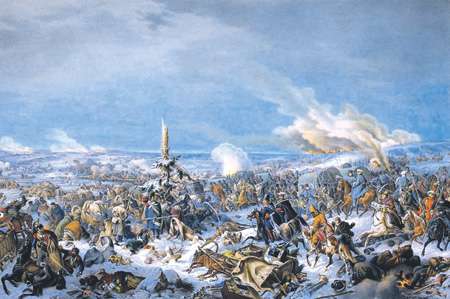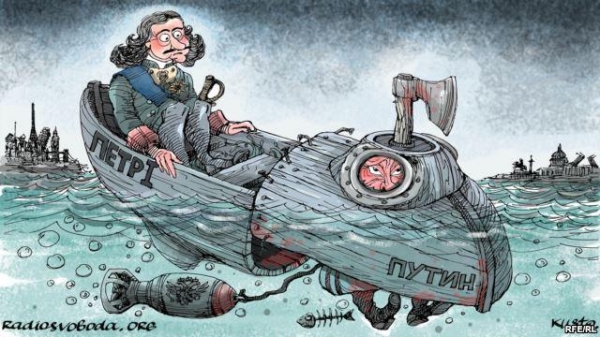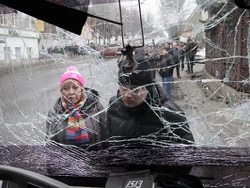
Almost any Russian, if he had to compare his country with any other, will surely not compare it with Portugal (which our President promised to catch up in terms of gross domestic product per capita in his famous article in “Nezavisimaya Gazeta” on 30 December 1999)
Of course, in this comparison for most items (except for our favorite, but not quantitatively measured indicators of spirituality and justice) Russia is losing America, but the interesting question is: why is this so? One of the versions of answer and want to offer.
The economist will likely explain the American success of the inviolability of private property, guaranteed the freedom of business and the continued influx of talented and energetic people from the rest of the world.
The analyst will pay attention to the separation of powers, rule of law and commitment to democratic principles that make the political system stable, predictable and accountable to the citizens.
Sociologist will tell you about the American Creed and national dream, mobilizing people, tolerant attitude to wealth and success, human rights and respect for the choice of each. And so on. However, I would like to draw attention to something else — the attitude of Americans to the history of his own country and to those who at different times have done.
If you look at American history, you find that it is nowhere and in no need to rewrite: everything that happened in this country for 240 years of its existence, may be told without hidden and “compromise”. Yes, in her pages, which is unlikely I would like to remember: the genocide of the original inhabitants of North America was sometimes carried out with extreme brutality, and slavery and the subsequent restriction of civil rights of blacks remains a shameful stain in the history of the country.
However, even these moments are not hidden. On the contrary, on the Washington Mall stands the Museum of the history of American Indians. Let us imagine the Museum in Moscow, which would have been evidence of Russian wars in the North Caucasus in the nineteenth century or of expulsion from their homes of Chechens or Crimean Tatars in 1944. Just beyond the Mall is a monument to Martin Luther king, the, in modern parlance, a human rights activist in US history. Again let’s imagine a monument to Andrei Sakharov in the place of, say, the Cathedral of Christ the Savior.
If a little walk around the neighborhood can be seen as a memorial in honor of those who died on the Atlantic and Pacific theaters of war in world war II is adjacent to the monuments to soldiers who died in Korea and Vietnam — wars, part of America in which seemed to this day looks at least ambiguous. And do we have any comparable memorial complex dedicated to Soviet soldiers who fought well in Afghanistan?
But it’s not just the monuments, but memory as a phenomenon. In Russia in recent years much has been said about the respect for the millennial history of our country, but there is a lot of questions about whether she’s worthy of such.
If you come in the same Boston where in his time was the start of the War of independence of the United States, in the heart of the city you can see several cemeteries, on which still lie the remains of passengers of the “Mayflower”, but the first British governors of Massachusetts, including the legendary John Winthrop. The graves of almost 400 years, but no mayor never thought to roll up in concrete, these valuable pieces of urban land and to build some new skyscrapers.
Moscow at least twice as old as Boston, but is it possible to find here (not counting the Royal necropolis) at least one cemetery with several dozen graves of the seventeenth century, not to mention more ancient?
In America talk less about the history than in Russia, but preserve and retain it much more carefully, since the Americans don’t mix history and ideology.
And because they was and remains the clear terminal as the nation, while the history in addition to the “state” has a strong personal inclination, which affects in one form or another, almost all reflecting the population of the country. In Russia, however, history is always complemented and complements the ideology, and today, when the last de facto does not exist, and declared a national idea of patriotism (more strange combination is difficult to come up with), and even a substitute for it, and therefore becomes brutal and impersonal.
Of course, it would be ridiculous to assert that in America history is not used to foster unity and support among the people the feeling of belonging to a unique, powerful and great country. But it is worth to make one important note. Perhaps it’s not too noticeable, but in the political history of the United States are practically non-existent not only “negative” characters, but persons and which would provoke social polarization.
Of course, many presidents had retired not too popular, and one was even forced to resign, but almost every recognized significant achievements, no one was anathematized, and, most importantly, no one was brutal against the opponent.
We know, for example, what happened during the Civil war the “ruler of Russia” Admiral Alexander Kolchak (apparently, with the knowledge and sanction of the Bolshevik government in Moscow). At the same time Jefferson Davis, the President of the Confederacy during the Civil war years of 1861-1865, after spending in prison two years, was subjected to the Amnesty, along with other participants in the war and lived quietly in their own country for over twenty years, being the head of a large insurance company and having released a book about the history of the Confederation.
It is quite clear that when the historical person is not considered its main task the settling of accounts with the predecessors or opponents, and not have to rewrite history
In Russia this tradition was started with the coming to power of the (largely random) of the Romanov dynasty, and since then never lost its relevance. Meanwhile, in order to respect the history in which each Chapter was corrected many times at the whim of one or another character, who led the country, at least you need to respect yourself. On the contrary, in a country where history is not concealed and distorted, it naturally becomes an occasion of pride of every citizen and a factor in the formation of a unified national identity.
It is worth noting one more thing. Although in the USA it is perfectly acceptable to criticize the government and President, to the people, who have people’s trust, practiced emphasized respect, the targeting of former officials in the media is almost negligible.
Many governmental and public buildings indicates the year built and the name of the President, at this time leading the country (in Russia’s case, this practice would be very instructive). A significant number of buildings and organizations are named this or that statesman and/or major benefactor, the honor of politicians deigned not their friends or allies in the party.
In 1997 and 1998, when the President-Democrat bill Clinton, Intercontinental airport Houston and national airport in Washington were named after zdravstvenih at the time of former presidents George H. W. Bush and Ronald Reagan. Now imagine yourself as Boris Yeltsin or Vladimir Putin in a solemn ceremony, in the presence of honor, noting the contribution of the Nobel laureate at the opening of Russia to the outside world, assign Sheremetyevo airport name of Mikhail Gorbachev. Presented? If you managed to do it, then maybe you’ll be able to feel the respect for national history. This was done in part because that history is so sacred a book from which you cannot tear out pages. No.
Of course, in Russia not all thrilled with how the authorities dealt with our history. Arise public initiatives like the “Forgotten regiment” or “Last address”, open the monuments of those Soviet historiography unequivocally regarded as enemies, begins to perpetuate the memory of victims of repression, are the Gorbachev Foundation and Yeltsin centre. However, with all due respect to the efforts of those behind these endeavors is to recognize that they are all attempts of the public to even slightly deviate from the new version of the “General course…”, which is now strongly promoted by the Kremlin. We are trying to fix something from long ago or recently retired, but meanwhile the story continues to be written as always it was written in Russia in the dense black and white.
In fact, all the above is a simple observation of the layman, in which, perhaps, many wrong and shallow. But I think that because Russia is not America that it cannot find in itself the capacity of public consent — the consent of the parts of society with each other and current leaders in with previous. This lack of agreement generates huge social costs of distrust, generates a fear of change, creates a nihilistic attitude to the law, because history just shows the powers that be that the loss of this power is fraught with loss of respect and sometimes freedom and even life.
So our poor officials for a “rainy day” create billions in offshore companies in Panama, are struggling with the democratic will of the people and coming up with mega projects, implementing are funded by the government, provide a comfortable life abroad to their descendants.
All they are doing is completely rational, because I do not consider this country my understanding that she got them — from Mikhail Romanov to Vladimir Lenin and Joseph Stalin to Vladimir Putin — mostly by accident. And actually, I’m not going to judge you.
I only would like never to hear from them that Russia will catch up with America, nor that it should respect the history of the country, the image they’ve made for ourselves…








